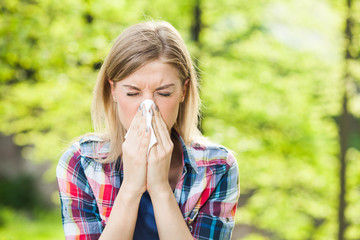
The sneezing, wheezing and itchy eyes that come along with spring can make anyone with allergies miserable. Thankfully, there are many ways to combat seasonal allergies, also known as allergic rhinitis or hay fever, which some people get year-round.
For instance, did you know that eating local honey can help to combat allergies as a type of immunotherapy? The honey works like a vaccine with its traces of pollen, and exposure helps the body build up immunity. Other ways to fight allergies include wearing sunglasses to keep pollen out of your eyes, getting rid of indoor plants that produce pollen, and washing linens on hot in the washing machine to remove dust.
MedAccess Urgent Care co-founder Dr. Dan Phillips sat down with Diana Pressey to explain the ins and outs of seasonal allergies.
Diana Pressey: First of all, what causes allergies, and why do they tend to increase in the spring?
Dr. Dan Phillips: Our body recognizes foreign substances, and it reacts in different ways. In March or April, the flowers will bloom, and there’s going to be pollen in the air, and people are going to get itchy eyes and runny noses and cough. That’s all consistent with environmental allergies like pollen. And we all have it in North Carolina, which is pretty bad for spring and fall allergies.
Pressey: How are allergies treated?
Phillips: Prior to maybe 1970, 1980, there was no treatment for allergies. You know, you took some Benadryl and you went to sleep. And then the non-sedating allergies came on board. We have some really good treatments — nasal sprays and non-sedating antihistamines. Your seasonal allergies can be controlled. Things like Claritin and Zyrtec and Allegra are all great treatments, Flonase nasal spray is great, people who have respiratory problems might get on an inhaler. But those are all things that go with seasonal allergies.
We’re coming up here in like a month from being into that season. And typically people have allergy seasons - some have spring seasons, which maybe go from March until June, and some people have fall seasons which may be related to ragweed and all the golden rod and things like that, and then there are some of us who are unfortunate, who (have allergies) from the first flower blooms to the last freeze of Thanksgiving. And the best treatment is to get your antihistamine of choice, get your Allegra, get your Nasacort or Flonase, and if that doesn’t cover you and you’re still having trouble breathing or sneezing or anything like that, then come on and see us.
Pressey: What are the main differences between allergies and a cold? How can people tell the difference?
Phillips: Allergies, you can predict. They almost occur on an annual event. And it’s sneezing, a little tightness in your chest, and wheezing, and itchy watery eyes. That’s consistent with allergies. And the thing that I really hate about allergies when I have them is the itchy eyes, and then you rub your eyes, and then they get worse. That’s absolutely allergy-related. The things that come with viruses and colds — you get a runny nose, and you get a little cough, but you usually don’t get the itchy, watery eyes.
Pressey: Are there any ways for people to reduce the amount of allergens they’re exposed to?
Phillips: There are a lot of home remedies. One of them is using, for instance, local honey. The bees pollinate different flowers, and if you use honey, you’re actually getting an exposure to those antigens. People can be tested for allergies and undergo immunotherapy. But (for) most of us with allergies, it’s a matter of taking a non-sedating antihistamine, and that’s your Claritin, Zyrtec, Allegra.
Pressey: Do you have anything else to say to those who have allergies or those who might be susceptible?
Phillips: I’ve got them, I understand it, I’m miserable. As soon as things start blooming, I start using Flonase, and I start using Claritin. And as long as I use those every day, I have a good day. And if you’re out cutting grass or doing things, you might need an inhaler to help keep you from wheezing. It’s just what happens in areas where allergies are a real problem.
Avoid the long wait for your primary care physician by visiting a MedAccess Urgent Care location in Chapel Hill, Roxboro or Youngsville. Walk in whenever you’d like and skip the wait by checking in online.
